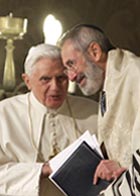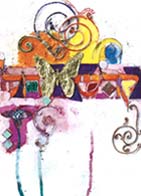Jewish Thought
 Dona Nobis Pacem
Dona Nobis PacemWednesday, January 20, 2010 | Jewish Ideas Daily » Daily Features
On Sunday, Pope Benedict XVI made his first visit to Rome's synagogue. Clouding the occasion was the feeling among many that the Vatican has yet to make an honest reckoning with its conduct in World War II, a failure epitomized in the process under way to beatify Pius XII. Despite a papal visit to Israel and meetings with Jewish leaders, Benedict has seemed surprisingly maladroit in his dealings with the Jewish community. More is at work here than manners. For the Pope, a serious philosopher and intellectual, the truths of faith and the truths of reason are mutually reinforcing gifts of...
 Let My People In
Let My People InThursday, January 14, 2010 | Jewish Ideas Daily » Daily Features
Debates over conversion to Judaism show no sign of abating, least of all in Israel. Last week, the legal adviser to the country's chief rabbinate declared that all conversions may retroactively be annulled at any time. In the ensuing firestorm of criticism, even some on the religious Right chimed in, especially those reflecting a historically more lenient Sephardi approach. A great deal of institutional politics is involved here, including between the ultra-Orthodox in Israel and the Modern Orthodox in the United States; some of this came to light in the recent disgrace and resignation of an ultra-Orthodox foe of the moderates....
 The Harshness of Creation
The Harshness of CreationLike the 2004 tsunami that devastated southeast Asia, yesterday's catastrophic earthquake in Haiti, a poverty-stricken country with a legacy of home-grown violence and suffering, inevitably provoked the terrible question: where was God? One answer derives from Jewish religious sources, and specifically from the teachings of the Kabbalah. It has to do with tzimtzum, or contraction: that is, God's own contraction and limitation of Himself in order to make space for the finite—and invariably flawed—worlds of physical nature and human action. The idea was most famously developed in Safed, Palestine by the 16th-century kabbalist Isaac Luria as part of a complicated, esoteric myth...
 Art is a Camera
Art is a CameraFriday, January 8, 2010 | Jewish Ideas Daily » Daily Features
Ever since the Second Commandment, with its prohibition of "images," Judaism has been an un-, or even anti-visual culture. Or so we are told. While there is some truth to this notion, it is a very limited truth. The realities—historical, philosophical, above all aesthetic—are much more complicated and much more interesting. After all, the Bible itself tells us that at Sinai the people "saw the voices." Scholars have demonstrated the rich visual culture at work in Jewish history, as well as the role of the visual imagination in theology and mysticism—and in the daily experience of those for whom Judaism is...
 Rabbi Who?
Rabbi Who?Tuesday, January 5, 2010 | Jewish Ideas Daily » Daily Features
A prominent rabbi in Israel has landed in hot water with his Orthodox colleagues for referring to the historical Jesus, admiringly, as a "model rabbi." This is not the first time that the American-born Shlomo Riskin, a long-time supporter of enhancing women's roles in Orthodoxy, has shown himself willing to push the religious envelope. Though he quickly qualified his reported remarks, this latest contretemps highlights not only internal debates within the rabbinic fraternity but also, more intriguingly, the changing shape of Jesus in the mind and imagination of contemporary Jews. On both sides, indeed, the dramatic diminishment over recent decades in official...
 The New Syncretism
The New SyncretismFriday, December 11, 2009 | Jewish Ideas Daily » Daily Features
In today’s Wall Street Journal, a professor of religion casts a gimlet eye at the widespread religious promiscuity in contemporary America. “Americans are swingers as well as switchers,” he writes, “flirting with religious beliefs and practices other than their own without officially changing their religious affiliation.” As more and more Americans “are now bellying up to . . . the ‘divine deli,’” the result is a “melting down [of] the sharp edges of the world's religions,” to the detriment of all parties. Among American Jews, the best-known variant of the syncretistic syndrome is the “JewBu” phenomenon, a do-it-yourself hybrid of...
 A Talmud for Today
A Talmud for TodayTuesday, December 8, 2009 | Jewish Ideas Daily » Daily Features
In Israel and the United States, high-level Talmud study thrives today with an intensity unmatched since the days of the great East European yeshivot. Yet to most English readers the Talmud, the essential Jewish compendium of legal and narrative discussion, remains a closed book—or rather 63 books. All the more reason, then, to welcome a new and expertly edited 900-page selection from the “sea of the Talmud.” What if a dip into the ocean doesn’t suffice? Two English-language editions have come to the aid of the student unversed in the original languages or modes of rabbinic reasoning: a partial translation...
Editors' Picks
By Faith Alone Israel Drazin, Jewish Ideas and Ideals. The late Rabbi Yehuda Amital was an influential Israeli educator, instrumental in integrating yeshiva study with military service, and an opponent of rabbis' setting public policy.
Why Study Talmud? Richard Hidary, Shofar. An important question, to which a collection of entertaining personal testimonies by contemporary talmudists repeatedly yields a common answer: for the joy of it.
The Mendelssohn Enigma Jerome E. Copulsky, Jewish Review of Books. Moses Mendelssohn's public image as the model of the cultured humanitarian Jew was arguably more important than his depiction of Judaism, which found few takers.
The Self-Centered Life Gil Student, Torah Musings. Why observe the Torah's commandments? Because, says an Orthodox rabbi channeling Oprah, they make you feel good about yourself.
Protestant Mishnah Amit Gevaryahu, Talmud Blog.
Can the ancient rabbinic code of law be studied on its own, apart from the commentaries, deliberations, and disputes of the Talmud?
Amy Winehouse, Cremation, and the Jews Alan Brill, Book of Doctrine and Opinions.
More than half of Americans in Western states are being cremated after death; can the Jewish community be far behind, and where have modern Jewish authorities stood on the issue?
Succeeding Lord Sacks Daniel Finkelstein, Jewish Chronicle. Britain's next Chief Rabbi will be Orthodox—needless to say. But is it too much to hope that, like Jonathan Sacks, he will also command the respect not only of other Jews but of Britons in general?
Whale on Rye Natan Slifkin, Rationalist Judaism. If a whale had cloven hooves and chewed its cud, would it be kosher?
On “Chutzbah” Fred MacDowell, On the Main Line. According to an 1896 essay, a "light sarcastic humor, smart but superficial," is a specialty of Jews, who, while abounding in insolence, fatally lack the modesty that is the mark of true genius.
Darwin's Rabbi Natan Slifkin, Rationalist Judaism. The 19th-century chief rabbi of Moravia was an early devotee of genetics and evolutionary theory, and saw in Judaism a "treasury of observations of nature and inquiries into it."

